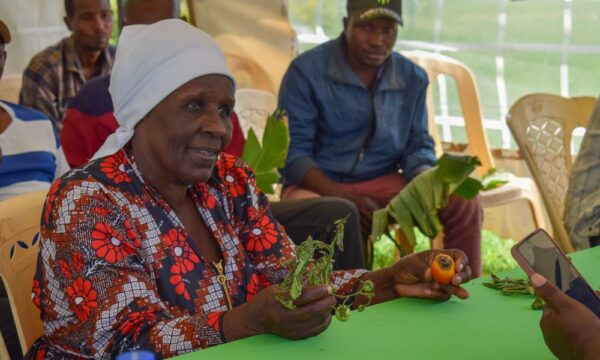
Banana plant showing symptoms of black Sigatoka disease (Fred Brooks, University of Hawaii at Manoa, bugwood.org CC BY licence)
Researchers at Equador’s Biotechnology Research Centre (CIBE) have isolated the genes that are responsible for conferring resistance to black Sigatoka in the naturally resistant banana variety Musa Calcutta-4. Scientists have now been able to develop a protocol for the genetic transformation of banana cultivars Williams and Orito as well as the plantain cultivars Barraganete and Dominico. This involved creating the embryonic cell suspensions needed to complete these transformations. Black Sigatoka is caused by the fungus Mycosphaerella fijiensis, which affects the leaves of banana plants, leaving them discoloured and wilting.
The first sign of infection is small brown specks on the leaves. Depending on the inoculum pressure, the symptoms can develop so far that the entirety of the leaf becomes black. It is possible, for plants with high disease pressure, to be left with no viable leaves at all at the time of harvest. Black Sigatoka has been found in all major banana-growing regions, including the top banana producing country, India. It can reduce the yield of banana crops considerably, which has led many farmers to convert their plantations, opting to grow crops such as cacao instead.

Spores of Mycosphaerella fijiensis (Fred Brooks, University of Hawaii at Manoa, bugwood.org, CC BY licence)
It is hoped this new discovery will lead to the development of resistant varieties that still retain locally adapted traits. This has come at a good time for Ecuadorian banana growers, who have faced a tough year. Adverse weather coupled with black Sigatoka meant that yields for the first quarter of 2012 were lower than that for 2011. Meanwhile, the price of bananas was falling and farmers were struggling on this reduced income. This led the Ecuadorian government to step in, offering smallholder farms free treatment sprays to reduce the impact of black Sigatoka. Some farmers, however, had to wait months for the spray and were worried help may never arrive.
New varieties, developed to contain resistant genes, are hoped to produce higher yields, benefitting the farmer. Moreover, the addition of resistant genes will reduce the fungicides that are currently required, saving the farmers money, easing stress on the environment and reducing the risk of agrochemical poisoning to workers.
Sources
7 Comments
Leave a Reply
Related News & Blogs
The ‘plant’ doctor will see you now
This blog was originally published on Good Food Movement Until five years ago, M. Muthulakshmi, a farmer from Thoppupatti village in Dindigul district, Tamil Nadu, relied heavily on chemicals, including banned antibiotics like streptomycin, for her pad…
4 February 2025





this problem exist in Trinidad and Tobago esp with plantain hope this research is accomplish
farmers in Trinidad have exhausted the use of fungicides.
[…] of fruits (good catch!), Ecuadorians find disease resistance gene in Indian banana. Or at least banana named after Indian […]
This is great news for Cocoa farmers of Trinidad and Tobago, who depend on bananas as a temporary shade crop which provide an additional income and harbours the midges required for cocoa pollination. Let’s take some Oil Money and invest in food for tomorrow!
I was informed that Centeno is doing research on same but do not know the status of such.
Yes,farmers want to get into plantain production but getting disease free planting materials are nil.
Other concern is labour ,yes the Minister want more production but nothing re labour and no input from ” Agriculture Now”
What is really going on?????
Those are 3 very valid questions Zobida. I can say that as far as the labour is concerned, we at the Cocoa Board have partnered with the Agriculture NOW to deliver quality cocoa skills training to “labour’ PROSPECTS. So far we’ve completed 2 cohorts and getting prepared to commence the 3rd cohort. Have you seen what the Budget had to present on this matter?
[…] readers may well remember a Nibble from a couple of months back announcing the “Discovery of genes for resistance to black Sigatoka in bananas” by Researchers at Equador’s Biotechnology Research Centre (CIBE). When I posted a link on […]
[…] Discovery of Genes for Resistance to Black Sigatoka in Bananas by Claire Curry […]